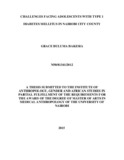| dc.description.abstract | Diabetes is a silent killer disease because many people live the disease without their knowledge, and for those who know about it, they have challenges managing its complications. Type 1 Diabetes Mellitus (T1DM) is a complex disease to manage. Adolescents with the disease have to deal with developmental challenges, and challenges of managing the disease. They are deemed to suffer the complications of the disease and therefore, not lead normal lives like their counterparts who do not have it. This study aimed at exploring the school-based and home based challenges faced by adolescents with type 1 diabetes mellitus (T1DM) in Nairobi City County. The study adopted a cross-sectional design that used qualitative methods of data collection, with the aim of getting the informants to describe their home based and school based challenges of living with the T1DM. The study was guided by the shifting perspectives model of chronic illness by Paterson (2001). The key informant interviews were conducted with 15 adolescents, aged 14–18 years, with T1DM recruited from a pediatrics outpatient diabetes clinic at the Kenyatta National hospital (KNH). In depth interviews were also conducted with 15 of their teacher/ school care givers at school and five of their healthcare providers at the KNH. Sample selection was through purposive non probability sampling, and a total of thirty five informants were sampled through the same method. Data analysis was done by thematic analysis, through reading of the interview scripts and identification of the emerging themes to gain an understanding of the challenges faced. The data was presented in themes, and verbatim quotes were used to give a clear picture of the challenges of the adolescents with T1DM. The results on the home based challenges showed that adolescents with T1DM had constant conflicts with their parents. These conflicts stemmed from non-adherence to the management regimes, the feeling of too much interference in their freedom to do things on their own, and their parents having to worry too much when they were away from home. The adolescent also conflicted with their parents because they felt that parents did not give them time to make their own independent decisions. The results also pointed out that the adolescents faced stigmatization from their friends and peers and at social events. Inaccessibility of health services was also a challenge because of the distance, and the unavailability of insulin as well as its cost. The adolescents also found the school environment (both day and boarding schools) rather restrictive for the management of their T1DM because of the inappropriate meals for adolescents with diabetes, and poor meal timing which interfered with their diabetes management plan. The inadequate information, education and communication on the part of the school personnel on how to deal with the complications arising out of increased or decreased sugar level was a also challenge. The other school based was on the part of the administration that set strict school rules that affected the management of T1DM. Such rules included not carrying syringes to school, not leaving the examination rooms, not having meals in classrooms, and in boarding schools, food from outside school was prohibited. This study contributed to the understanding of the challenges faced by adolescents T1DM in the Nairobi City County, and it was one to of the few studies to explore the diabetes experience using the shifting perspectives model of chronic illness. It enabled the making of recommendations for school personnel and community at large, based on the participants’ interpretations of the needs of diabetic adolescents in the schools. The study therefore recommended that the teachers, parents, peers and the community at large, need more training and awareness on T1DM. Learning institutions in Kenya should formulate a diabetes policy to help the diabetic adolescents with the disease management. Further studies may look into the psychological challenges. | en_US |
| dc.description.department | a
Department of Psychiatry, University of Nairobi, ; bDepartment of Mental Health, School of Medicine,
Moi University, Eldoret, Kenya | |



